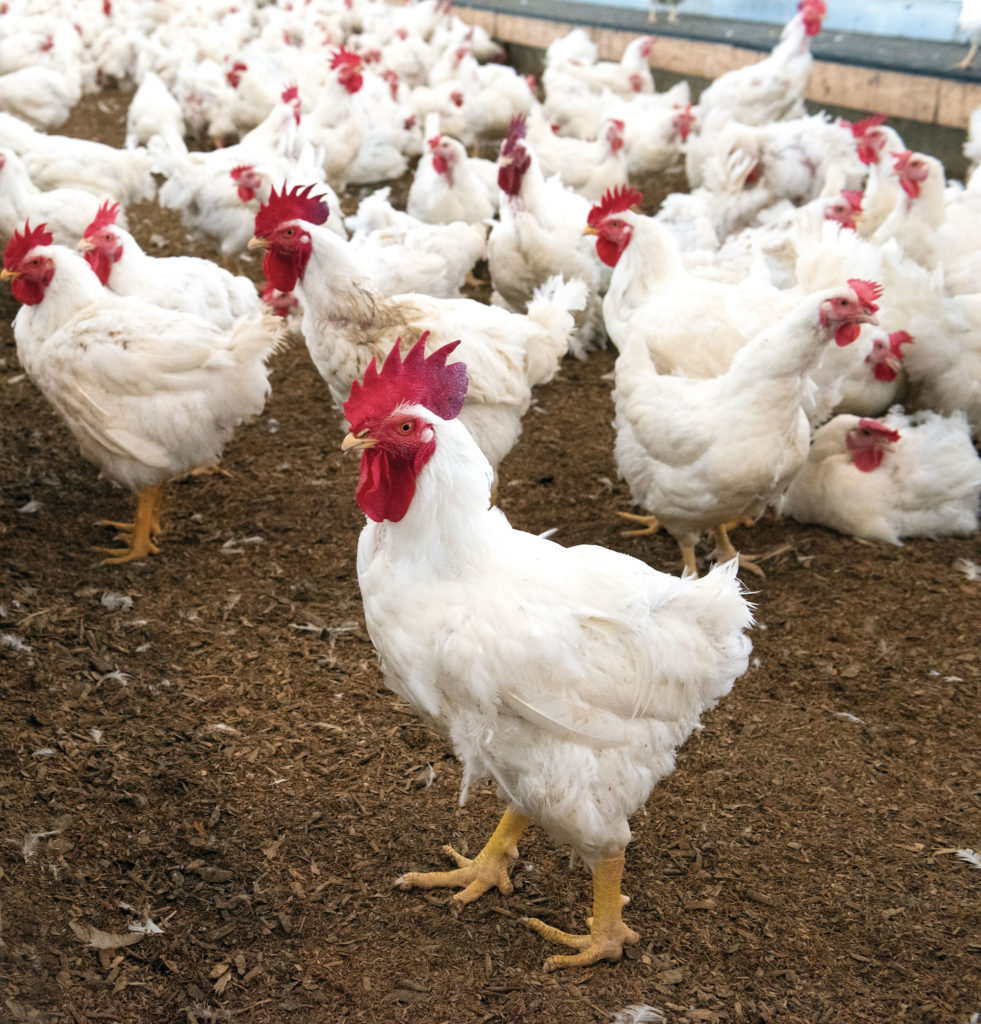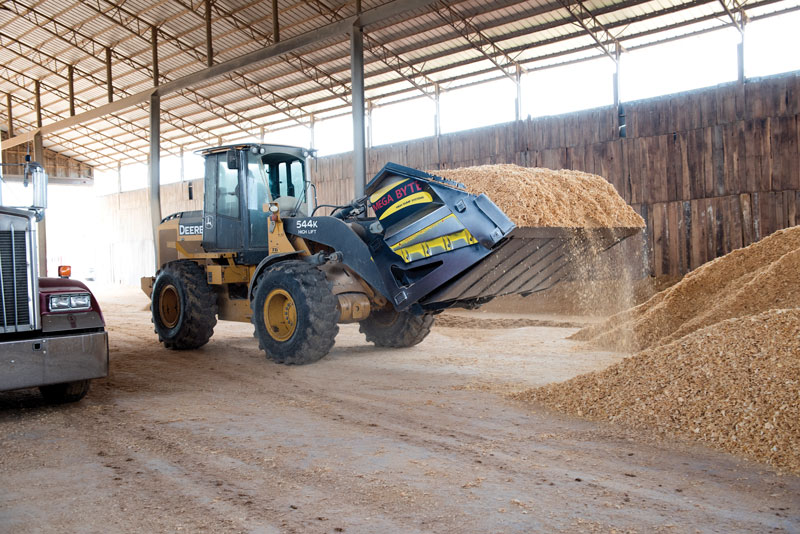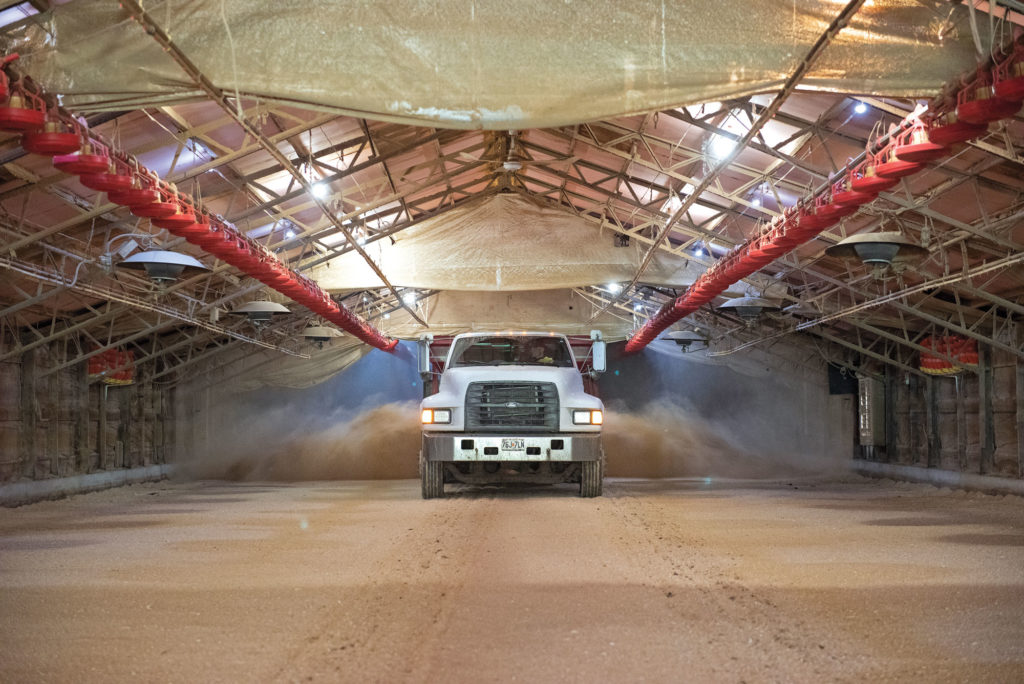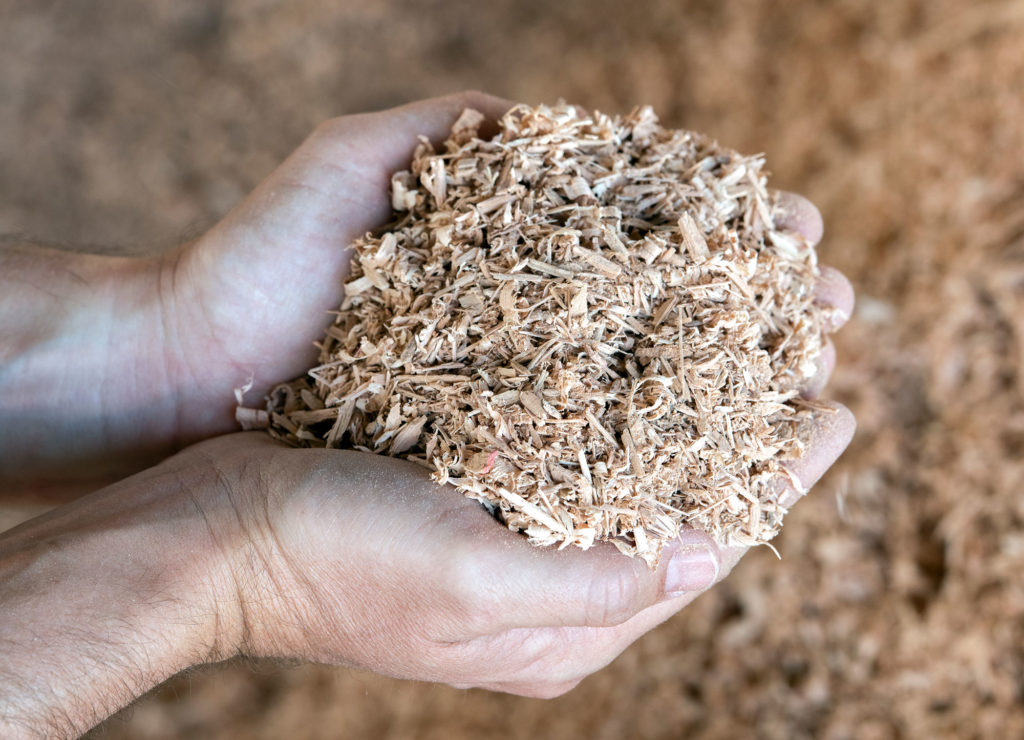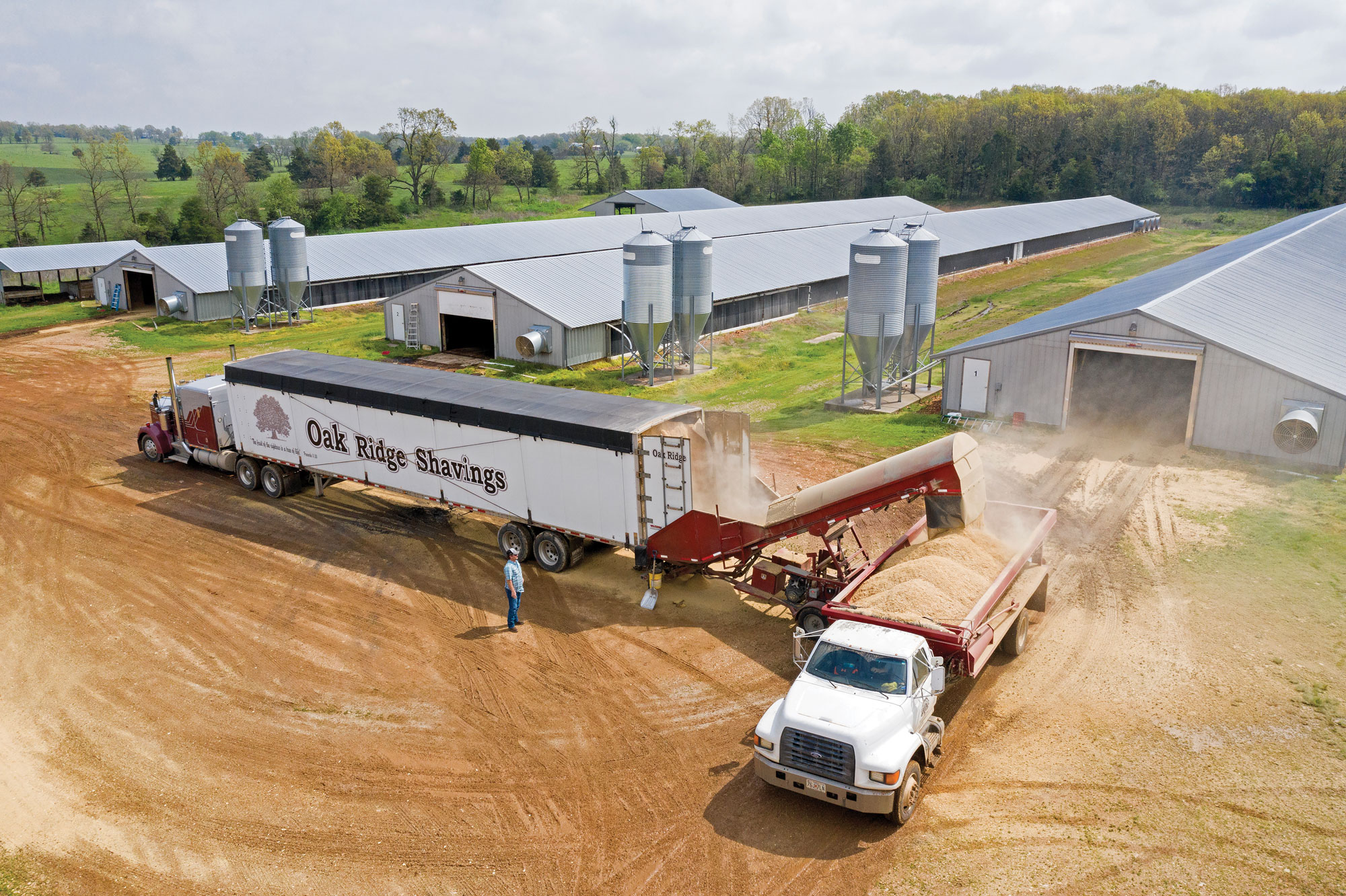
Oak Opportunities
June 7, 2021
Written By Jason Jenkins
More Than Two Decades Ago, One Southwest Missouri Company Helped Turn an Unwanted Byproduct into a Valued Commodity
They say perception is reality. In the late 1990s, the perception among poultry producers was that oak shavings weren’t a good bedding material inside chicken houses. Del Oney didn’t believe that was reality.
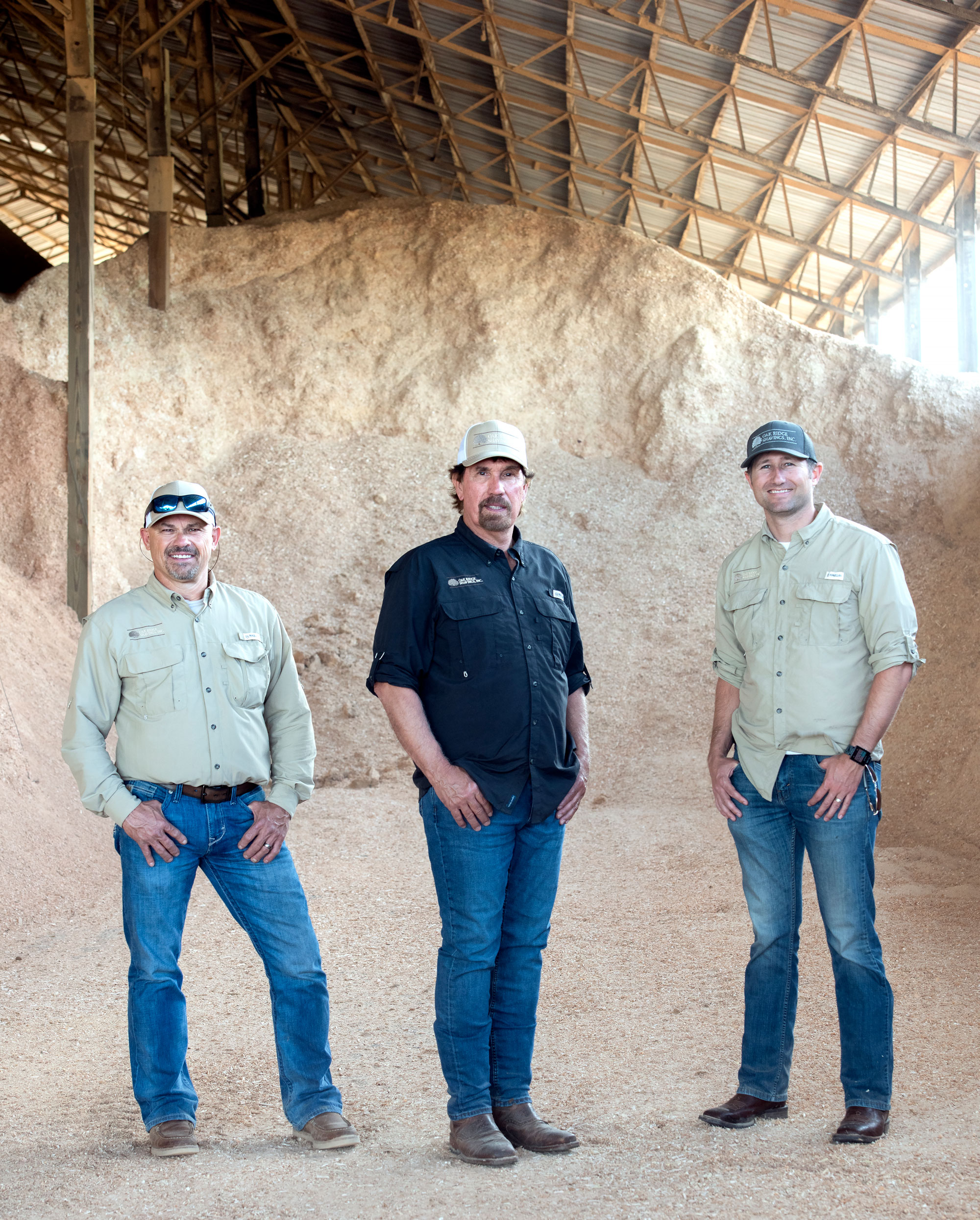
So, in 1999, he co-founded Oak Ridge Shavings, literally transforming the industry at the ground floor. Today, the company provides farmers in southwest Missouri, northwest Arkansas and northeast Oklahoma with quality bedding materials on which hundreds of millions of chickens are raised annually. In a typical year, Oak Ridge delivers around 1,200 semitrailer loads of bedding to poultry houses within a 125-mile radius of its facility west of Monett, Mo.
“We started with one driver and a leased truck and trailer,” Oney says. “Today, we have a fleet of 16 semis, 11 full-time drivers and more than 20 employees altogether. God has certainly blessed us, both with opportunities and with dedicated employees.”
A Product with Promise
Oney was already employed in the poultry industry when he decided to jump into the bedding business. As a broiler service technician for Tyson Foods, he worked directly with contract farmers who raised chickens for the company. Oney would visit their farms, answer their questions and ensure that conditions inside their facilities were ideal for growing chickens.
“Back then, the poultry companies were wary of using oak as bedding in the barns because of Aspergillus,” he says, referring to a mold that can make chickens sick. The mold’s presence was more likely in oak byproducts from green timber with higher moisture, but all oak was generally avoided.
However, Oney recognized opportunity. He knew a nearby manufacturer that was producing truckloads of oak shavings each week—and all of it was kiln dried. That meant little chance for potential issues with moisture and Aspergillus.
“I approached Tyson about trying it. It took a little doing, but they eventually gave their blessing to trying a few loads,” Oney says. “We didn’t have any problems whatsoever in those barns. It was all downhill from there.”
Bedding Basics
Many materials can be used for poultry bedding. Today, the most common are kiln-dried hardwood shavings, pine shavings and rice hulls. According to Sara Orlowski, an associate professor and poultry specialist with the University of Arkansas Cooperative Extension Service, the best bedding materials are those that soak up moisture but don’t hold it too long.
“When growing broilers, you don’t want a lot of moisture in the barn. It can create issues with mold and bacteria, increase ammonia levels and cause problems with the broilers’ footpads,” she says. “The bedding should be a material that’s going to absorb moisture from feces. Then, as the fans in the barn move the air around, the bedding will let go of that moisture so it can get out of the house and away from the birds.”
Due to their typically larger particle size, kiln-dried shavings have more surface area than some other materials. This allows the birds’ feces to mix into the bedding and reduce their contact with it, Orlowski says.
“I also think those kiln-dried shavings have greater longevity in the barn,” she adds. “They hold up a bit better as you go through multiple flocks and you’re turning that litter over after each flock trying to get the bacteria load down.”
Today, Oak Ridge Shavings offers poultry producers a full range of bedding materials that can be custom mixed. A combination of rice hulls, pine and various hardwood shavings is popular, Oney says.
Broiler operations generally raise six to seven flocks in a barn before replacing the bedding. This occurs about once a year, most often in the spring or fall when the old litter can be spread as fertilizer on nearby agricultural fields. Oak Ridge will then deliver the new material and spread it inside each barn. One 53-foot-long semitrailer holds more than 140 cubic yards of bedding—enough to cover the floor of a standard 40-by-400-foot barn to a depth of 4 inches.
Oney says the business has changed immensely since Oak Ridge began, especially when it comes to sourcing material.
“Back then, that oak was a byproduct with no value. They’d take it to the dump just to get rid of it,” he says. “Now, it’s a commodity. We have to pay for everything.”
The COVID-19 pandemic also has placed constraints on the availability of material. Manufacturing has decreased as companies struggle to hire employees, Oney says.
“There’s one plant where we used to get a load about every day, but now we’re lucky to get one every two weeks,” he says. “Normally, they have 42 people working at that plant. Right now, they have 12. They can’t find the personnel.”
Poultry and Partnership
In 2007, Larry Zebert joined the Oak Ridge family as the spreader driver, becoming a partner in the company five years ago. Like Oney, he has poultry experience and currently raises broiler chickens for Tyson on his farm near Pierce City, Mo. Zebert says having that firsthand knowledge of the industry helps them build strong relationships with customers.
“Because I know how to grow a chicken, I know what problems they might be dealing with and can help them, especially the newer growers who don’t have that experience yet,” he says, adding that he’s raised chickens for 12 years. “I’m not just somebody trying to sell them bedding. They trust us.”
Cliff Fitchpatrick—who also raises broiler chickens for Tyson on his farm near Wentworth, Mo.—has purchased bedding from Oak Ridge since the company formed. He echoes Zebert’s sentiment.
“I’ve been around this business a long time, and Del and Larry have a genuine concern for the growers,” he says. “In the spring, it’s kind of a madhouse as all the barns get cleaned out. If the weather doesn’t cooperate, everybody gets backlogged. Then they all start to get anxious and demanding. But those guys understand what the growers need, and unlike some of the other outfits, they really try to take care of the customer.”
He adds that Del and Larry’s personal experience raising poultry also bolsters the confidence producers have in Oak Ridge’s bedding materials, including the hardwood shavings.
“When you put baby chicks on brand-new bedding, you don’t want to be worrying about mold or Aspergillosis,” Fitchpatrick says. “We’ve never had any problems with their kiln-dried shavings. They do a good job of providing quality bedding materials while also trying to keep the price down.”
Beyond Bedding
In addition to serving the region’s poultry industry, Oak Ridge has expanded its operation in recent years by creating what’s referred to as the “commercial” division.
“To keep our drivers busy when the farm side of things isn’t as demanding, we diversified what we do,” Del explains. “Now, we haul material to manufacturers in other industries year-round. In the past few years, the volume of material we deliver on the commercial side has actually surpassed the ag side.”
Oak Ridge supplies raw material for a wide range of products—everything from composite decking boards and cat litter to charcoal briquets and wood pellets used for smoking and grilling food. Bedding for small pets such as rabbits, guinea pigs and hamsters has been a natural fit, too.
In 2019, Oney’s son-in-law, Michael Moyer, joined the company as operations manager. He says new opportunities to expand the business exist, but they are moving forward cautiously.
“It’s important to all of us that we’re not just doing business. We want to be doing good business,” says Michael, who has a background in sales and marketing. “It’s about quality instead of quantity. We don’t want to lose the personal touch.”
Oney agrees.
“If you genuinely care about a person, they know it,” he concludes. “This ain’t just about money or business. It’s about people, taking care of people and helping them take care of business. With that philosophy, you can’t go wrong.”
To learn more about Oak Ridge Shavings, visit oakridgeshavings.com or call 417-489-9006 or 417-214-0891.


